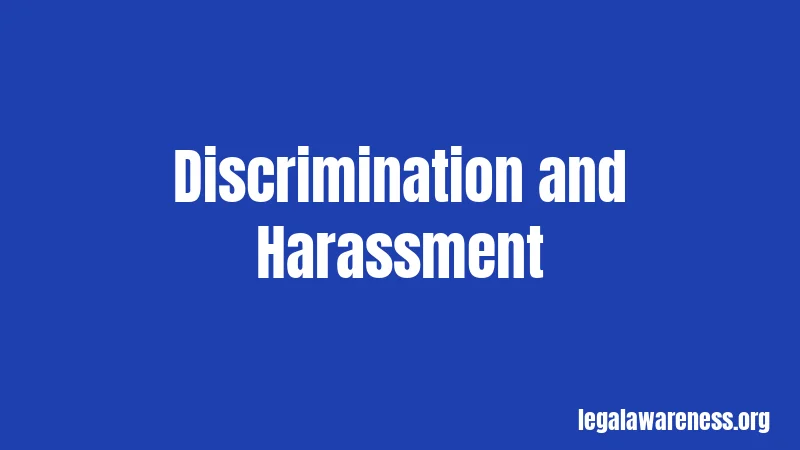Employment Laws in Indiana (2026): Your Complete Workplace Rights Guide
Most people have no idea how many workplace rules actually protect them. Seriously. Indiana has dozens of employment laws that cover everything from minimum wage to discrimination. And if you don’t know your rights, you could be missing out on protections you deserve.
Here’s the deal. Whether you’re starting a new job or dealing with workplace issues, understanding Indiana employment laws can save you major headaches. Let’s break down exactly what you need to know.
What Are Employment Laws?

Employment laws are rules that protect workers and tell employers what they can and can’t do. Think of them like the rulebook for your workplace. These laws cover your pay, your safety, and how your boss can treat you.
Indiana follows both federal laws and its own state rules. The state laws often give you extra protections beyond what federal law requires. Pretty important stuff, right?
Minimum Wage and Pay Rules
Current Minimum Wage
Indiana’s minimum wage is $7.25 per hour. That’s the same as the federal minimum wage. It hasn’t changed since 2009.
Hold on, this part is important. If you earn tips, your employer can pay you just $2.13 per hour. But your tips plus that hourly wage must equal $7.25 per hour. If they don’t, your employer has to make up the difference.
There’s also a training wage of $4.25 per hour. Employers can use this rate for workers under 20 years old, but only for the first 90 days. After that, you get the full minimum wage.
Getting Paid Overtime
You earn overtime when you work more than 40 hours in one week. Overtime pay is 1.5 times your regular hourly rate. So if you normally make $10 per hour, overtime bumps that up to $15 per hour.
Not everyone gets overtime though. Some jobs are exempt. These include executive, administrative, and professional positions where you can hire or fire people and earn at least $150 per week. Employees under 16 are also exempt from overtime rules.
Wondering if this applies to you? Most hourly workers are covered. Salary workers might be exempt depending on their job duties.
When You Get Your Paycheck
Employers must pay you at least semi-monthly. That means twice a month. You can also request to be paid bi-weekly, which is every two weeks.
Your employer has to pay you within 10 business days after the pay period ends. If you leave your job, you get your final paycheck on the next regularly scheduled payday. No special rush payment required.
Break Time and Meal Periods

Here’s a surprise for many people. Indiana doesn’t require employers to give adults any breaks at all. Yep, that’s right.
If your employer does give you short breaks of 20 minutes or less, they must pay you for that time. Longer meal breaks don’t have to be paid, as long as you’re completely free from work duties.
Wait, it gets different for younger workers. Minors must get a 30-minute break if they work six or more hours straight. But that rule was changed in 2020, so it only applies to workers under 18.
Employers with more than 25 employees must give nursing mothers reasonable breaks to pump breast milk. These breaks must be available for up to one year after the baby’s birth. Your employer also has to provide a private room that’s not a bathroom stall.
Working Hours for Minors
Indiana made huge changes to youth employment laws in 2025. Let’s break it down.
16 and 17 Year Olds
As of January 1, 2025, all work hour restrictions were removed. These teens can now work the same hours as adults. No limits on hours per day or per week. They can work late nights. They can work long shifts.
No parental permission required either. Pretty much total freedom when it comes to scheduling.
14 and 15 Year Olds
Younger teens still have restrictions. During the school year, they can’t work before 7 a.m. or after 7 p.m. They’re limited to three hours on school days and 18 hours per week total.
But summer is different. From June 1 through Labor Day, they can work until 9 p.m. That’s two hours later than before. Outside summer, the 7 p.m. limit still applies.
Employer Requirements
Employers who hire five or more minors must register them in the Youth Employment System (YES). This online system replaced work permits in 2021. The Indiana Department of Labor uses it to track minor employees.
Honestly, this system makes things easier. No more paper permits to lose or renew.
Discrimination and Harassment

Indiana takes workplace discrimination seriously. Multiple laws protect workers from unfair treatment.
Indiana Civil Rights Law
This law covers employers with six or more employees. It prohibits discrimination based on:
- Race
- Color
- Religion
- Sex (including pregnancy)
- Disability
- National origin
- Ancestry
- Veteran status
Sound complicated? It’s actually pretty straightforward. Your employer can’t treat you differently or fire you because of these characteristics.
Other Discrimination Laws
The Indiana Employment Discrimination Against Disabled Persons Act applies to employers with 15 or more employees. It requires employers to provide reasonable accommodations for workers with disabilities.
The Indiana Age Discrimination Act covers employers with just one employee. It protects workers between 40 and 74 years old from age-based discrimination.
Workplace Harassment
Harassment based on protected characteristics is illegal. This includes offensive jokes, racial slurs, sexual comments, and unwanted physical contact. Basically anything that creates a hostile work environment.
One important note though. A single incident usually doesn’t count as illegal harassment. The behavior typically needs to be repeated or severe.
Filing a Complaint
You have 180 days to file a discrimination complaint after the discriminatory act happens. That’s about six months. Don’t wait too long or you might lose your chance.
You file with the Indiana Civil Rights Commission. For employers with 15 or more employees, you can also file with the federal EEOC.
Most people don’t realize how strict these deadlines are. Mark your calendar if something happens.
Leave Laws and Time Off
Indiana doesn’t require employers to offer paid sick leave. That decision is up to your employer. Same goes for vacation time and holidays.
Family and Medical Leave
Indiana doesn’t have its own family leave law. But if you work for a larger employer, you might qualify for federal FMLA. This gives you up to 12 weeks of unpaid leave for serious health conditions or to care for family members.
Your job is protected while you’re on FMLA leave. Your employer can’t fire you just for taking it.
Special Leave Types
Indiana offers some unique leave protections. Members of the Civil Air Patrol can take unpaid leave for emergency operations. Volunteer firefighters and emergency medical workers get similar protections.
These aren’t common, but they matter if you serve your community in these ways.
At-Will Employment
Stay with me here. Indiana is an at-will employment state. This means your employer can fire you for almost any reason or no reason at all.
Before you panic, there are limits. Your employer can’t fire you for illegal reasons like discrimination or retaliation. They also can’t violate an employment contract if you have one.
Think of it like this. Most job relationships in Indiana can end at any time, by either party, unless a specific law or contract says otherwise.
Workers’ Compensation
Every Indiana employer must carry workers’ compensation insurance. This coverage starts on your first day of work.
When You Get Injured
Report workplace injuries immediately to your supervisor. Then you have 30 days to file a claim. Missing this deadline could mean your claim gets denied.
Workers’ comp covers medical expenses and lost wages from work-related injuries. It can also provide benefits to your family if you die from a job injury.
You’re gonna love this one. Workers’ comp benefits aren’t taxable. That’s why you only get 66 2/3% of your average weekly wage. The lower percentage balances out the tax savings.
Medical Care Rules
Your employer controls which doctors you see for work injuries. If you’re unhappy with the medical care, you can file an application with the Workers’ Compensation Board. But always talk to your employer first.
Can’t receive unemployment and workers’ comp at the same time though. You have to pick one.
Unemployment Insurance
Lost your job through no fault of your own? You might qualify for unemployment benefits.
Who Qualifies
You need to have earned enough during your “base period.” That’s usually the first four of the last five calendar quarters before you file. The minimum is around $3,200 over that entire period.
You also need to be able and available to work. And you must actively look for a new job.
How Much You Get
Benefits are calculated based on your highest earning quarter. The maximum weekly benefit is $445. If you have dependents, you might get an extra $50 per dependent, up to $150 total per week.
Here’s where it gets interesting. Employers pay for unemployment insurance, not employees. Nothing comes out of your paycheck for this program.
Filing Your Claim
File online through the Indiana Department of Workforce Development. You’ll create an account in Indiana Career Connect. This same account helps you search for new jobs.
Most claims get resolved without problems. But if your claim is denied, find out why. Often you can fix issues by providing more information or records.
Workplace Safety
The Indiana Occupational Safety and Health Administration (IOSHA) enforces safety standards. These rules protect you from dangerous working conditions.
Employers must provide safe workplaces. This includes proper equipment, training, and protection from hazards. If you see safety violations, you can report them to IOSHA.
The INSafe division offers free consultations to help businesses improve safety. They don’t issue fines during these voluntary visits. Pretty smart approach, honestly.
Recent Changes for 2025
Okay, pause. Read this carefully. Several major changes took effect in 2025.
Non-Compete Agreements
Courts are now much stricter about non-compete agreements. They typically only enforce agreements lasting 6-12 months, not years. Geographic restrictions need clear business justification.
If you signed a non-compete, it might not be as restrictive as you think.
Religious Accommodations
Following the Supreme Court case Groff v. DeJoy, employers must do more to accommodate religious practices. The bar for proving “undue hardship” is higher now.
Nursing Mother Protections
The PUMP Act strengthened protections for nursing mothers. More employers must provide break time and private spaces for pumping.
These changes reflect growing worker protections. Keep an eye out for future updates too.
What Employers Can’t Do
Let’s talk about what’s off limits. Employers in Indiana cannot:
- Discriminate based on protected characteristics
- Retaliate against you for filing complaints
- Fire you for taking protected leave
- Refuse to pay minimum wage or overtime
- Ignore workplace safety requirements
- Ask about sealed or expunged criminal records
- Require you to implant devices in your body (yes, that’s actually a law from 2020)
Knowing these boundaries helps you spot violations when they happen.
How to Protect Your Rights
Document everything. Seriously. Keep emails, texts, and notes about important workplace events. Write down dates, times, and witnesses.
If you believe your rights were violated, you have options:
First, try talking to your employer or HR department. Many issues can be resolved internally.
If that doesn’t work, contact the appropriate agency. The Indiana Civil Rights Commission handles discrimination. The Department of Labor deals with wage and hour issues. The Workers’ Compensation Board manages injury claims.
You might also want to talk to an employment lawyer. Many offer free consultations to review your situation.
Don’t worry, we’ll break this down step by step. You’re not alone in navigating these systems.
Special Situations
Criminal Background Checks
Employers can run background checks, but with limits. They can’t ask about sealed or expunged records. They also can’t discriminate based on arrest records that didn’t lead to convictions.
Wage Deductions
Your employer can only deduct certain things from your paycheck. These include:
Insurance premiums you agree to. Uniform costs up to $2,500 per year or 5% of weekly earnings. Education or training reimbursement. Payroll advances you request. Items you buy from your employer.
All deductions need your written agreement. You can cancel most deductions anytime with written notice.
New Hire Reporting
Employers must report new hires to the state. This helps track child support obligations and prevent fraud. You don’t do anything for this. It’s on your employer.
Frequently Asked Questions
Can my employer fire me for any reason in Indiana?
Mostly yes, because Indiana is an at-will state. But they can’t fire you for illegal reasons like discrimination, retaliation, or violating an employment contract.
Do I have to get breaks at work?
Not if you’re 18 or older. Indiana doesn’t require meal or rest breaks for adults. If your employer gives you breaks under 20 minutes, they must pay you for them.
How long do I have to file a discrimination complaint?
You have 180 days from when the discrimination happened. That’s about six months. Missing this deadline means you probably can’t file.
Can a 16-year-old work full-time in Indiana?
Yes, as of January 2025. All hour restrictions for 16 and 17-year-olds were removed. They can work the same hours as adults.
What’s the minimum wage for tipped workers?
$2.13 per hour, but your tips plus wages must equal at least $7.25 per hour total. If they don’t, your employer pays the difference.
Final Thoughts
Now you know the basics of Indiana employment law. These protections exist to keep workplaces fair and safe. But they only help if you know about them and use them.
If you’re facing workplace issues, don’t hesitate to get help. Talk to a lawyer, contact the right agency, or reach out to worker advocacy groups. Your rights matter.
Stay informed, document important events, and speak up when something isn’t right. That’s how you protect yourself in the workplace.
References
- Indiana Department of Labor – Official state agency website with current labor law information – https://www.in.gov/dol/
- Indiana Civil Rights Commission – Filing discrimination complaints and understanding protected classes – https://www.in.gov/icrc/
- Indiana Code Title 22 – Official state statutes covering labor and safety – http://iga.in.gov/legislative/laws/2024/ic/titles/022/
- Worker’s Compensation Board of Indiana – Information about workplace injury claims – https://www.in.gov/wcb/
- Indiana Department of Workforce Development – Unemployment insurance and employer requirements – https://www.in.gov/dwd/
